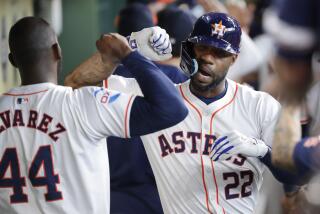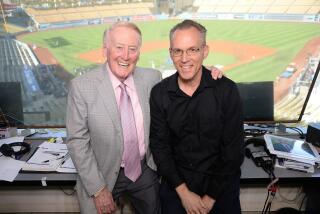Brothers in Arms
- Share via
PHOENIX — They were always there for each other, J.J. and Logan Hardy.
Born 17 months apart, they grew up in Tucson as constant companions and ceaseless competitors, playing baseball, basketball, soccer, tennis, golf, pingpong, you name it. And when it got dark, they trudged inside and stayed up until the wee hours talking about their hopes and dreams.
“It just felt like you had your best friend living with you all the time,” Logan Hardy recalled.
Yet, life blessed one brother with fortune and fame and cursed the other with the indelible views of death and destruction.
One became a soldier and brought the war home with him. The other became a major league shortstop at 22, but not before he went through a summer of anguish following shoulder surgery that he feared would cut short his budding baseball career.
After high school, Logan Hardy joined the Army, learned to fire a rifle and was sent to Fort Sill, Okla., to serve as a communications specialist, setting up satellites. A year later, J.J. Hardy was drafted by the Milwaukee Brewers, learned to hit with wood and was sent to Ogden, Utah, to begin his journey to the big leagues.
Last summer, pain and despair drew the brothers back together.
J.J. Hardy was off to an impressive start at triple-A Indianapolis when he swung at an inside fastball on May 9 and his left shoulder popped out of its socket, slitting the muscle in both the front and back and sending a searing jolt through his lanky, 6-foot-2, 180-pound frame.
Three weeks later, Dr. Lewis Yocum repaired the shredded shoulder, but the real scars were the nagging fears that his trek to the big leagues was falling one step short.
He didn’t take calls from friends or teammates, wouldn’t listen to the radio or read the newspaper or watch sports or surf the Web. He just couldn’t stand the thought of baseball going on without him.
“I really got depressed,” he said. “I didn’t want to watch baseball. I didn’t want to hear anything about baseball. I just kind of sat and did nothing.”
Logan Hardy, now 24, was holed up back in Tucson going through a different torment.
He and seven members of his unit had joined the 3rd Infantry Division’s northward sprint toward Baghdad when the war started. Their assignment was to search for weapons of mass destruction. What they found was pure hell.
“We saw a lot of dead bodies, a lot of people blown up, stuff like that,” Logan Hardy said.
Upon his return stateside, he suffered from post-traumatic stress disorder, went through a divorce, received an honorable medical discharge and moved back home with his parents, trying to get his life in order.
He wasn’t talking much, either.
One night, J.J. Hardy called his brother and asked him to come live with him in Tempe.
“We’ve always been there for each other, since we were 2 and 3 years old, playing catch in the backyard,” said Logan Hardy, who quickly packed up his car.
The two spent countless hours resting in J.J. Hardy’s new Jacuzzi and reassuring each other about the future.
J.J. Hardy broke down and talked about his apprehension that he’d never be the player he once was, and his big brother told him not to worry.
Logan Hardy opened up and talked about the things he’d seen in Iraq and how he wondered if the nightmares would go away, and his little brother promised they would.
Slowly, the scars began to fade.
Their mother, Susie Hardy, was thankful her boys had each other.
“They’ve been close their whole lives,” she said. “They were bad together; they were good together. Everything, they just did it together. So, it was just natural for them to support each other when they went through the tough times.”
Susie Hardy watched all the war coverage she could, “just like I was watching J.J.’s baseball games,” but never realized Logan had been on the front lines, rumbling across the desert to Saddam Hussein’s palaces.
The family was delighted when he returned stateside, but he brought the war back with him.
“Not all of it came out at once, it’s still coming out,” Susie Hardy said. “It’s still kind of sinking in and it’s just nice for him to have a brother to talk it over with. He said a few things to me and his dad, but not much.
“And what helped J.J. get perspective was seeing that Logan really went through a heck of a lot more than what he’s going through,” she added. “I think he realized, ‘I can survive this surgery if my brother’s surviving the war.”’
It was also a load off J.J. Hardy’s shoulders to know his brother was no longer overseas and under fire, she said.
Logan Hardy soon found work at an auto repair shop and J.J. Hardy spent his days rehabbing at the Brewers’ spring training complex in Phoenix. Every night, they’d sit in the whirlpool, talking and listening to each other.
“It was like when we were young,” Logan Hardy said.
Eventually, Logan Hardy said, the nightmares began to go away.
His little brother picked up a baseball and slowly began to trust his body again.
J.J. Hardy broke camp as Milwaukee’s starting shortstop, the club’s first rookie to make his debut on opening day since Paul Molitor in 1977.
He couldn’t have done it without his brother.
“We were both there for each other, always have been,” J.J. Hardy said. “Ever since we were old enough to talk, we’ve been best friends and did everything together.
“Nothing’s changed.”
More to Read
Go beyond the scoreboard
Get the latest on L.A.'s teams in the daily Sports Report newsletter.
You may occasionally receive promotional content from the Los Angeles Times.










